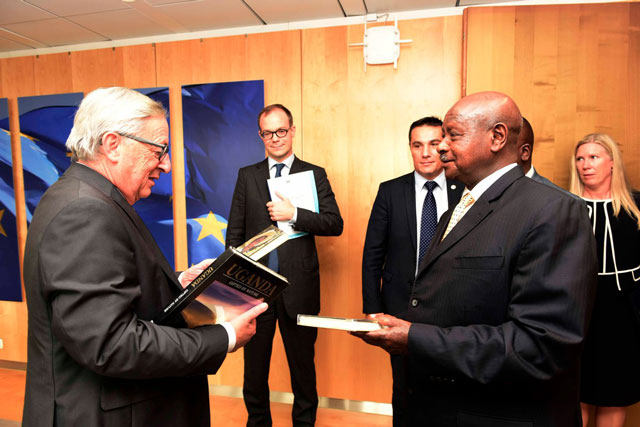
Kampala, Uganda | PPU | President Yoweri Museveni has met the European Union (EU) Commission President Jean-Claude Juncker and presented a raft of concerns raised by East African Community (EAC) member states on the Economic Partnership Agreements (EPA).
Leading a delegation of EAC trade ministers to the meeting at the EU headquarters in Brussels on Thursday, President Museveni, who is also Chairperson of the EAC, noted that the bloc sought several clarifications before making a final decision on the EPA.
On the team was Uganda’s trade minister Amelia Kyambadde and her colleagues Adan Mohamad (Kenya), Prof Palamagamba Kabudi (Tanzania) and Alain Nyamitwe, the Burundian Minister for External Relations. Rwanda and South Sudan sent high-level government bureaucrats.
Key among the concerns is the question of strategic industrial development, the denunciation process, development agenda, the rendezvous, joint declaration and domestic support.
On strategic industrial development, Museveni noted that once the trade pact is signed, up-to 65% of imports (mainly machinery and raw materials for industrialization) from the EU to EAC will come in at zero rate, which is similar to a current policy position East Africa already has with the EU.
“What happens when EAC partner states start producing these items and now need to protect them after signing the EPAs?” Museveni asked. (read proposed EAC-EU agreement Page 2)
I accompanied President Museveni in Brussels to discuss EAC-EPA agreement with President of the European Commission, Jean-Claude Juncker. pic.twitter.com/MKTaosKwbI
— EAC Sec General (@LMfumukeko) September 28, 2017
Case for individual countries
Another concern for East Africa, noted Museveni, is the fact that the EPAs does not allow individual countries to exit.
“The denunciation clause should allow individual signatory states to withdraw from the agreement,” said Museveni.
As far as the development agenda is concerned, Museveni said the EPAs clauses on the European Union supporting structural and infrastructural development in East Africa are non-binding yet these are crucial for leveling the ground for equitable trade.
EAC states also raised issue with the fact that the EPAs direct that negotiations must be concluded within five years after entry into force of the agreement.
This rendezvous clause, said Museveni, imposes unlimited pressure on negotiators “rather than paying attention to substance of the negotiations.”
 The Independent Uganda: You get the Truth we Pay the Price
The Independent Uganda: You get the Truth we Pay the Price


